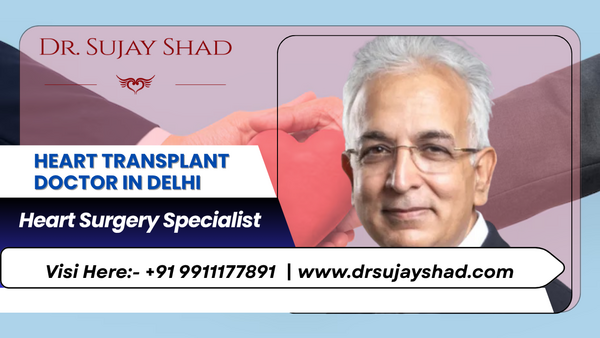Notifications
ALL BUSINESS
COMIDA
DIRECTORIES
ENTERTAINMENT
FINER THINGS
HEALTH
MARKETPLACE
MEMBER's ONLY
MONEY MATTER$
MOTIVATIONAL
NEWS & WEATHER
TECHNOLOGIA
TV NETWORKS
VIDEOS
VOTE USA 2026/2028
INVESTOR RELATIONS
COMING 2026 / 2027
ALL BUSINESS
COMIDA
DIRECTORIES
ENTERTAINMENT
FINER THINGS
HEALTH
MARKETPLACE
MEMBER's ONLY
MONEY MATTER$
MOTIVATIONAL
NEWS & WEATHER
TECHNOLOGIA
TV NETWORKS
VIDEOS
VOTE USA 2026/2028
INVESTOR RELATIONS
COMING 2026 / 2027
About Me
 Dr Sujay Shad
Dr Sujay Shad Dr. Sujay Shad is a Expert Heart Surgery Doctor in Delhi. He is the Director of Heart Transplants and the Co-Chairman of the Cardiology Department at Sir Ganga Ram Hospital, which is recognized as one of the Best Hospital for Heart Surgery in Delhi, Visit: Dr. Sujay Shad for Heart Surgery Transplant.

Posted by - Dr Sujay Shad \
5 hours ago \
Filed in - Health \
hearttransplant hearttransplantdoctor hearttransplantsurgeon hearttransplantsurgery \
13 views \ 0 comments \ 0 likes \ 0 reviews
Hello there, confused about deciding on heart transplant surgery? You better understand that a heart transplant operation can give you a chance to live longer and healthier if you are diagnosed with end-stage heart disease. Although it’s a complex surgery of replacing a failing/diseased heart with a healthy donor heart, you need it, if it’s safe for you and you want to live more. To make sure you know the main key points about heart transplant surgery, here we bring 10 FAQs on heart transplant surgery, answered by a Heart Surgery Specialist in Delhi at Sir Ganga Ram Hospital, a leading heart hospital in India.
Q.1 What is the necessity of heart transplant surgery?
Ans-: A heart transplant is the last resort, the only life-saving option available with a cardiac surgeon. When there is end-stage heart failure or a life-threatening arrhythmia, that causes beyond-repair damage to the heart for which alternative treatments become ineffective.
Q.2 What happens in a heart transplant surgery?
Ans-: heart transplant surgery is carried out on a patient who lies unconscious, under the effect of general anesthesia. For temporary life support, the patient is put on a heart-lung bypass machine which provides ongoing blood circulation, when the heart is being replaced.
The surgeon carefully makes an open incision in the chest of the patient to take out the diseased heart and put in its place a healthy donor heart. The major blood vessels are linked to the new heart and it is restarted.
For the start, a pacemaker is used. Once the donor's heart is pumping right, the surgeon closes the incision and drains out excess fluid. The donor's heart could be of a person declared brain dead or is dead and the family does not object to heart donation.
Q.3 Who is eligible to get a heart transplant?
Ans-: A heart transplant is typically suitable for young, otherwise healthy patients, suffering from life-threatening arrhythmia, severe heart failure, or end-stage cardiac disease.
Q.4 What is the duration of a heart transplant surgery?
Ans-: A heart transplant operation is typically over in 4 to 10 hours, as per the case complexity.
Q.5 What is the preoperative evaluation process before a heart transplant?
Ans-: The preoperative evaluation is a must as it involves a comprehensive assessment of the heart health and other organs health of the patient with certain routine tests. It even includes checking on the mental and physical health of the patient to ensure the surgery rigors are being best handled by the patient and the patient is even following proper post-operative care instructions.
Q.6 What will happen after receiving a heart transplant?
Ans-: Once the surgery to receive a heart transplant is over, the patient is shifted to an intensive care unit (ICU) of the surgical facility and monitored for vitals, and kept in a sterile environment to be free from infections for several days. If the patient is recovering right, the patient is shifted to the recovery room.
On the surgeon’s approval, the patient can go back home. The patient will have to take prescribed immunosuppressants for the remaining life to ensure no organ rejection.
Q.7 What precautions will be required after a heart transplant? Can I live normally?
Ans-: Leading a normal, healthy life is possible after a successful hair transplant if the patient adopts a healthy lifestyle and takes precautions, as suggested by the surgeon. The patient will have to go for regular check-ups with the surgeon to evaluate recovery progress and overall health.
Some of the general precautions include avoidance of heavy weight lifting, heavy workouts, or anything that puts pressure on the chest or causes chest discomfort. The patient needs to be regular with medicines, take a proper heart-healthy diet, and perform heart-healthy exercise.
Q.8 How lengthy is the recovery following a heart transplant?
Ans-: The recovery time is variable. However, generally, the patient can expect to stay hospitalized for 1-3 weeks. A complete recovery would take several months.
Q.9 What is the life expectancy after getting a successful heart transplant?
Ans-: Life expectancy following a successful heart transplant depends on individual factors and the patient's adherence to medical advice provided by the heart transplant surgeon following and before heart transplant surgery.
Q.10 How long is the waiting for a new heart?
Ans-: After getting a surgeon’s approval for a heart transplant, the patient is put on the waiting list of individuals who are seeking a donor heart in the city.
The time of waiting for a healthy donor heart will depend on the patient’s and donor’s blood type, immunologic match, and body size. While waiting for a donor's heart, the patient is asked to maintain a healthy lifestyle so that postoperative experiences are as expected.
Till then, the patient may receive an insertable, mechanical circulatory support device for the heart to function normally and be monitored for problems, thereby improving the quality of the patient.
Original Source:- https://www.globhy.com/article/10-faqs-on-heart-transplant-surgery-answered-by-surgeon

Comments